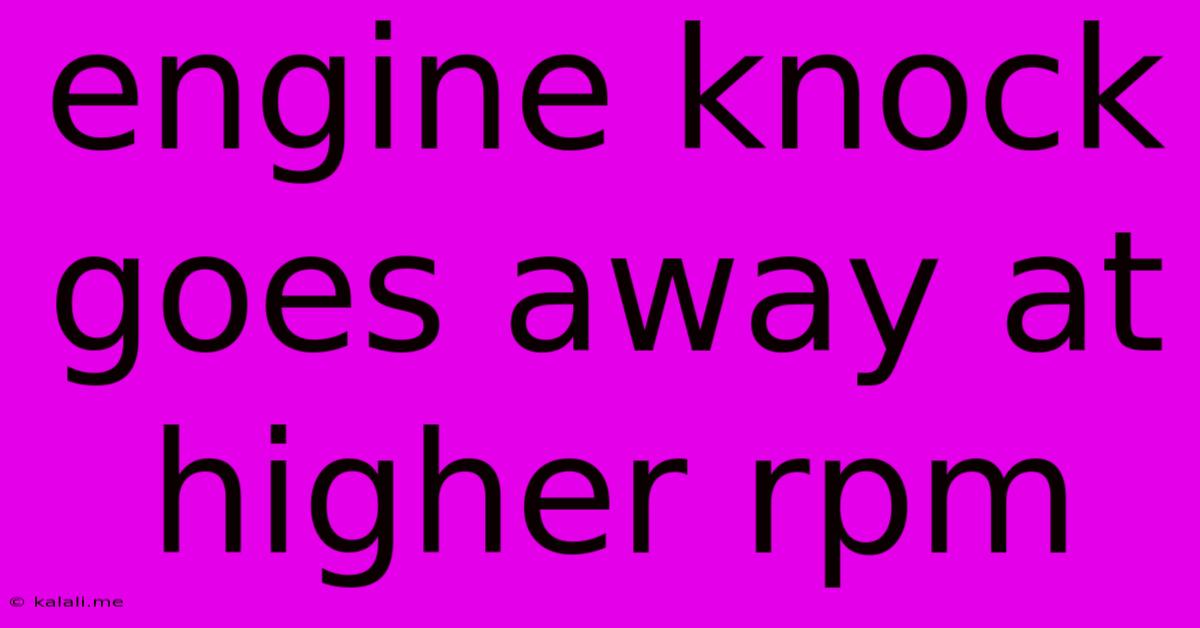Engine Knock Goes Away At Higher Rpm
Kalali
Jun 01, 2025 · 3 min read

Table of Contents
Engine Knock That Disappears at Higher RPMs: Causes and Solutions
Engine knock, that unsettling pinging or rattling sound from your engine, is a serious issue that shouldn't be ignored. While a consistent knock usually points to a critical problem needing immediate attention, a knock that only occurs at lower RPMs and disappears at higher RPMs presents a slightly different, yet still concerning, puzzle. This article will explore the potential causes of this intermittent engine knock and outline the steps you can take to diagnose and address the problem.
Understanding the Mystery: Why Knock at Low RPMs?
The disappearing act of the knock at higher RPMs suggests the issue is related to engine timing and fuel delivery under specific load conditions. At lower RPMs, the engine operates under lighter loads and might experience combustion irregularities. This could be due to several factors, each contributing to the characteristic pinging sound associated with detonation.
Potential Culprits:
-
Low-Octane Fuel: This is perhaps the most common and easily fixable cause. Using fuel with a lower octane rating than your engine's requirement can lead to pre-ignition, where the air-fuel mixture ignites before the spark plug fires. This uncontrolled combustion results in the knocking sound. The higher RPMs might allow for more efficient combustion, mitigating the knock. Switching to a higher octane fuel is the simplest solution to try first.
-
Advance Ignition Timing: The engine's ignition timing controls when the spark plug fires. If the timing is too advanced, it can cause pre-ignition, leading to knock, especially under low-load conditions. At higher RPMs, other factors may slightly retard the timing or improve combustion efficiency, masking the problem.
-
Carbon Buildup: Excessive carbon deposits on the piston crowns and combustion chamber walls can create hot spots. These hot spots can initiate pre-ignition, causing the knock at lower RPMs. The increased heat and more efficient combustion at higher RPMs might help to disperse the heat, reducing the knock.
-
Vacuum Leaks: A vacuum leak in the intake manifold can lead to a lean air-fuel mixture, making the engine more susceptible to detonation, especially at low RPMs. Again, higher RPMs may compensate for this, lessening the effect.
-
Sensor Issues: Faulty sensors like the crankshaft position sensor (CKP) or mass airflow sensor (MAF) can send incorrect data to the engine's computer, resulting in improper fuel delivery or timing, leading to knock.
-
Worn Piston Rings: While less likely to only manifest at lower RPMs, worn piston rings can affect compression, allowing for less efficient combustion and increasing the chances of knock at lower speeds.
Troubleshooting and Solutions:
Diagnosing the exact cause requires a systematic approach. Here’s a suggested path:
-
Check the Fuel: The easiest first step is to switch to a higher-octane fuel grade. If the knock disappears, you've likely identified the culprit.
-
Inspect for Vacuum Leaks: Carefully examine all vacuum hoses and connections for cracks or leaks. A mechanic can use a smoke machine to identify hidden leaks.
-
Consider Carbon Cleaning: If a carbon buildup is suspected, a professional engine decarbonization service can remove the deposits and improve combustion.
-
Professional Diagnostic: A mechanic can use diagnostic tools to check the engine's sensor readings, ignition timing, and other parameters. This will help pinpoint issues with sensors or the engine's computer.
-
Compression Test: A compression test will reveal the health of your engine's cylinders and piston rings, helping to rule out compression-related issues.
Prevention is Key:
Regular maintenance, including timely oil changes and using the correct fuel grade, can significantly reduce the risk of engine knock. Avoiding aggressive driving habits and keeping your engine properly tuned can also contribute to a longer, knock-free lifespan.
When to Seek Professional Help:
If the knock persists despite your efforts, or if you notice other symptoms like reduced performance or excessive engine smoke, it's crucial to consult a qualified mechanic. Engine knock can lead to serious engine damage if left unaddressed. Professional diagnosis is essential to prevent costly repairs or even engine failure.
Latest Posts
Latest Posts
-
How Much Is 2 Sprigs Of Thyme
Jun 02, 2025
-
How Can I Tell If Wood Is Pressure Treated
Jun 02, 2025
-
Hold Door From Banging In The Wind
Jun 02, 2025
-
Peter Says Paul Is Hard To Understand
Jun 02, 2025
-
How To Get Off Melted Plastic From Stove
Jun 02, 2025
Related Post
Thank you for visiting our website which covers about Engine Knock Goes Away At Higher Rpm . We hope the information provided has been useful to you. Feel free to contact us if you have any questions or need further assistance. See you next time and don't miss to bookmark.